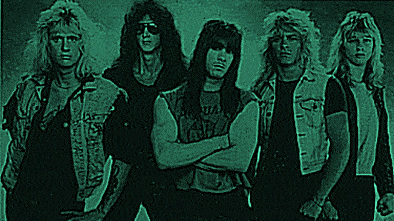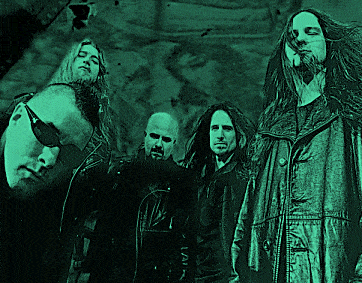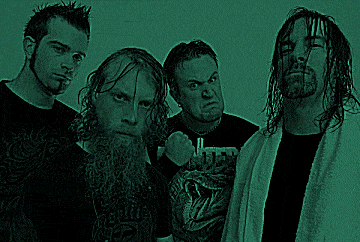 In between rehearsals, they began playing the Ottawa Valley circuit. But venues that welcomed their brand of thrash metal they were developing were few and far between, and they wrote material while finding places to play. This lineup of the group lasted less than a year, and Waters and Malek continued writing and recording, during which time demos of the songs “Welcome To Your Death” and “Phantasmagoria” got attention from several labels looking for something other than the burgeoning ‘hair metal’ sound. After recording some more demos that seemed generally well-liked, they were still without a deal, but the demo tapes became hot commodities on the trading circuit – up there with demos from Metallica and Megadeth. But by the summer of ’87 Waters packed up and moved to Vancouver. The first order of business was bringing in frontman Randy Ramped (ex of DOA). For the better part of a year and a half, they were in and out of the studios doing the bulk of what would become the band’s debut album In 1989, ALICE IN HELL. Released on Roadrunner Records, the band was rounded out by guitarist Anthony Greenham, drummer Ray Hartmann, and Wayne Darley on bass. Along with a remake of “Welcome To Your Death,” “Wicked Mystic,” and “Schizos Are Never Alone,” the album was heralded for its freshness in a metal world that most critics agreed had become stagnant. Though domestic sales were less than 30,000, European audiences ate it up to the tune of nearly 100,000 copies. Some dates with Testament on home soil led to some more overseas, where they quickly became live favourites on the festival circuit. But when they returned to the studios the following spring, the line-up shuffle continued for their sophomore album a year later, NEVER, NEVERLAND. With new singer Coburn Pharr (ex of Omen) and guitarist David Scott Davis, more frantic fretwork took centre stage with one of the thrash metal audience’s classic albums. They even surprised the label’s execs when it peaked at #48 on the UK heavy metal chart, on the backs of the title track and “Fun Palace.” The already busy revolving door continued to rotate during the next year while backing up Judas Priest and Pantera. Hartmann and Pharr left the band and were replaced by Mike Mangini. When Roadrunner Records sold the band’s options to Sony Music, they were sent to the studios to deliver the expected commercial hit, much as was being expected of other thrash bands. But despite doing well in the UK and south east Asia, they failed to deliver in ’93 with SET THE WORLD ON FIRE, so the label followed the trend at the time and dropped the band following their tour of Japan. It was prior to that tour that Darley had to quit the band, unable to get the proper documentation done, and now without a label, they quietly disbanded. While everyone went their separate ways, Waters remained in the studios over the next year working on some material. Though mostly a solo album, it was released as Annihilator’s fourth effort, KING OF THE KILL in 1994. The deal with Hypnotic Records started a long string of albums with various indie labels, but for all intents and purposes, the band itself didn’t exist. While re-releases of previous material that included some early demos and live tracks were being issued, Waters reunited with guitarist Dave Davis and drummer Randy Black for REFRESH THE DRAGON in the fall of ’95. Listed by the thrash critics as one of the most evolved sounds with cutting fretwork in songs like “City of Ice” and social commentary in “The Pastor Disaster.” The album’s re-release a year later also included a live version of AC/DC’s “Riff Raff.” Waters continued to more or less keep the band itself on hiatus over the next few years while moving back to Ottawa, assembling touring versions when needed. In 1997, he released the album REMAINS, which was actually mostly material that had been kicking around for a few years, including some co-written by John Bates and Mike Leakey. But the labels were still dismayed at the lack of a breakout hit, though what was considered selling out by some like Metallica, Megadeth, and Pantera had all done. With the exception of bassist Wayne Darley, who was replaced by Russ Bergquist, 1999’s CRITERIA FOR A BLACK WIDOW was a reunion of Waters with the original recording lineup of singer Randy Rampage, guitarist Dave Davis, and drummer Ray Hartman. But after a series of successful shows in the UK, Rampage left and was replaced by new singer Joe Comeau, formerly of Overkill and Liege Lord. They kicked off the new millennium in ’01 on Steamhammer Records with CARNIVAL DIABLOS, followed by WAKING THE FURY a year later. By this time, Curran Murphy had replaced Davis on guitars and the core of the writing team was Waters and Comeau. A radio edited version of “Nothing To Me” became the band’s first top 50 hit on the metal charts when the album was re-released a year later. But although the album continued the trend of doing well on the European markets, though the breakout North American hit still eluded them. By the time ALL FOR YOU was released in late 2004, Waters had again watched members drift in and drift out over the years, only reforming a touring version now and again for minimal live dates during that time. With new vocalist Dave Padden, the album actually followed the limited edition EP called THE ONE by a few months, which contained two versions of the song “All For You” and “Weapon X,” which didn’t appear officially until a year later on the SCHIZO DELUXE album.
After releasing their performance at the 2008 Masters of Rock Festival in Viscovise in the Czech Republic the following year, next up was the self-titled album in 2010. Along with a cover of Van Halen’s “Romeo Delight,” it also featured the track “25 Seconds,” about the Robert Dziekanski incident, in which the RCMP were absolved of any wrong-doing, though the Polish immigrant died after being tasered five times at the Vancouver International Airport in 2007. For its release, and frustrated at the overall lack of support received at home Waters opted for several indie labels, each handling distribution in what was still the band’s markets – the UK, Eastern Europe, and Japan, as well as in Australia. North American patrons were left going to iTunes. 2010 also saw Roadrunner release THE BEST OF ANNIHILATOR, which also gave the band reason to cut some videos for songs like “Set The World On Fire,” Alison Hell,” and “Stonewall.” In 2011, Annihilator played in Canada for two live shows for the first time in nearly two decades, to a sold-out crowd at Quebec City’s Imperial Theatre, and then with KISS and Motorhead at the Heavy MTL Festival in Montreal. |



 They returned to their roots in more ways that one in 2007. Re-signing with Roadrunner Records for their new album, METAL, it featured Waters maintaining the bulk of the writing duties. Praised by the critics as their best album in years,like its last few predecessors, it also featured a host of cameo appearances from the likes of
They returned to their roots in more ways that one in 2007. Re-signing with Roadrunner Records for their new album, METAL, it featured Waters maintaining the bulk of the writing duties. Praised by the critics as their best album in years,like its last few predecessors, it also featured a host of cameo appearances from the likes of 